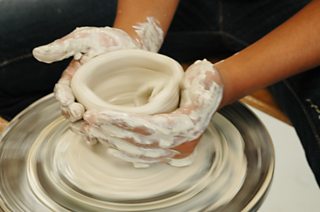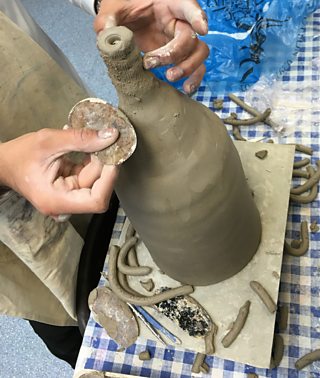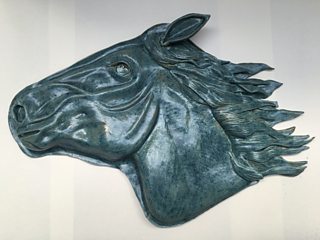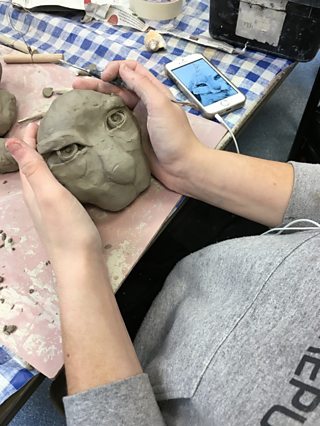What Is Pinch Method in Art What Is Score and Slip
Ceramics
Ceramics is the fine art of making 3 dimensional objects from clay. The choice of clay and the techniques used to shape, decorate, coat and fire it will all take an impact on the final piece.
Building techniques
Compression pots
Pinch pots are one of the earliest known methods of shaping clay to create a functional grade.
A tennis ball-sized slice of clay is rounded off in the palm of the manus. The thumb of the other hand is then used to pierce the ball of clay, being careful not to push all the style through to the other side. With the thumb yet inside, the wall of the clay is then pinched and stretched whilst the ball is turned in the palm. This will eventually transform the ball into a small bowl shape.
Pinch pots are a useful way to get-go a project. You lot can bring together two together to make a hollow structure, which could form the base of a sculpture or coil pot.
Throwing
Throwing is the nigh recognised ceramic technique. Wedged dirt is centered on a pottery cycle and functional or sculptural forms are created as the clay spins. The clay needs to exist kept moist throughout the process to ensure hands tin movement easily to guide the vessel.
Throwing is a highly skilled technique and potters use it to mass produce forms with near-identical qualities.

Pulling
Pulling is most commonly used for creating handles on cups, teapots and similar functional items.
A thick, sausage-similar piece of clay is covered with water and pulled to course a long, even gyre that can exist attached to clay forms.
Coiling
Coiling is a simple technique that tin produce dramatic shapes. A piece of clay is formed for the base of an object. Ideally information technology is placed on a lath and turntable to make it easier to piece of work round. Coils, which tin can be prepared in advance, are then carefully congenital up from the base.
Each curlicue is scored and slipped before being attached to ensure the vessel won't collapse. To avoid curl separation, the inner and outer surfaces of the coils are smoothed together. This tin can exist done with fingers or a flat-edged tool.

Slab building
Slab building is a process that needs conscientious preparation. However, once you take created your slabs, you lot can very quickly construct aggressive and highly impressive sculptural piece of work.
Clay is rolled into sheets - ideally effectually 1.5cm thick. An even thickness tin can exist achieved past placing wooden guides at each side of the clay as it is flattened.
Once the slabs have reached a leather-hard consistency, they can and then easily be cut and used to build a three-dimensional shape.

Relief
Relief is a popular choice for schoolhouse projects. It is an effective and low-risk technique as less stress is put on the clay. It is a good technique for edifice upwardly conviction with working in three-dimensions. Y'all can offset with a 2D image or object and gradually build up depth to create a sculptural course.
Slabs of clay can be laid over pre-formed objects to create 3D shapes, which can then exist built upon using modelling and hand edifice techniques. This is specially useful for making masks.

Paw building
Hand building is a quick and effective sculpting method. Small pieces of clay are composite together to build forms such every bit animals, portraits and organic shapes.
Dirt should not exist left thicker than 2cm as air pockets risk forming, which could lead the clay to crack or explode during the firing process.

Modelling
Modelling is a versatile technique near commonly used for creating portraits, animals, flowers and other decorative items.
Small 'pellets' of dirt can be used to gradually build upwards a multifariousness of shapes and forms. This allows greater control over the slice as it grows. Tools are also frequently used to carve shapes and requite precise finishes to the piece of work.
trowbridgeyousand.blogspot.com
Source: https://www.bbc.co.uk/bitesize/guides/zsnbg82/revision/3
0 Response to "What Is Pinch Method in Art What Is Score and Slip"
Post a Comment